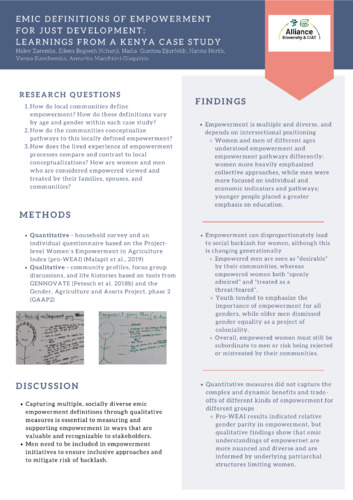EMIC definitions of empowerment for just development: Learnings from a Kenya case study
Abstract
This study examines how men and women in Cambodia and Kenya define empowerment and describe empowerment pathways, and how empowered people are perceived by their families and communities. The study found that different genders and cultures define empowerment of women and men differently. In Kenya, conceptualizations of an ‘empowered man’ focused on economic factors, while an ‘empowered woman’ was primarily defined according to personal virtues, such as being ambitious and self-sufficient. In Cambodia, men and women alike focused on economic empowerment definitions and pathways. Additionally, empowered men and women are perceived differently by their communities. Empowered Kenyan men were seen as ‘desirable’, whereas empowered women were ‘openly admired’ and ‘treated as a threat/feared’ in equal turn. In Cambodia, men and women felt that empowered women would be welcomed by the community, but women felt that they may be resented by their husbands. Results revealed that the underinvolvement of men in empowerment initiatives has contributed to resentment and feelings of neglect. These findings suggest that in supporting the effective empowerment of women and men, there is a need to center emic definitions, actively engaging men, including introducing safeguards for backlash against empowered individuals, and redressing norms that hinder acceptance of empowered women by their families and communities.

